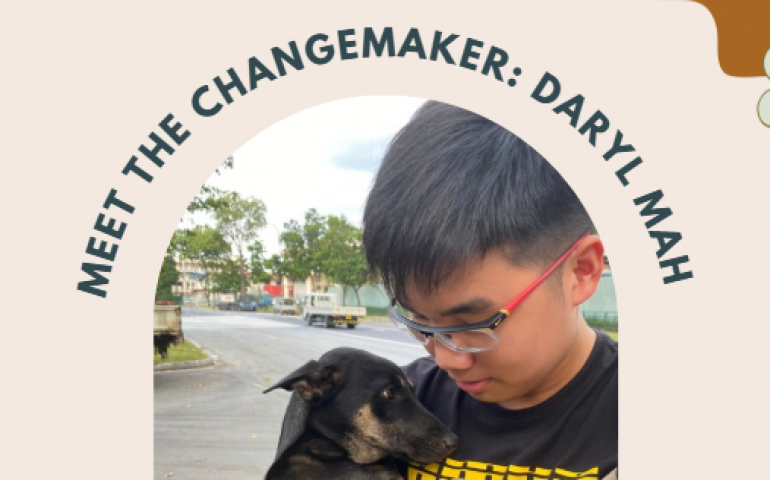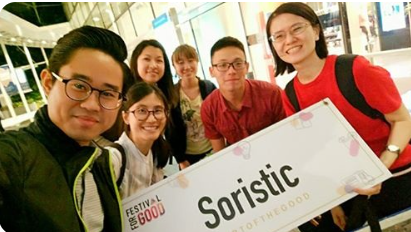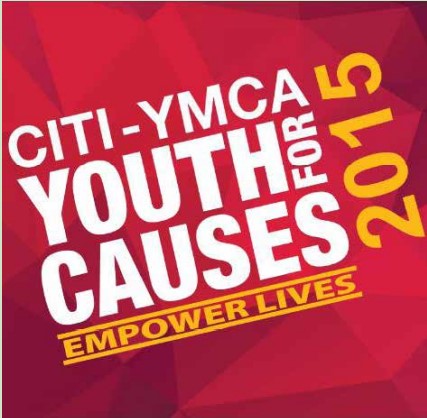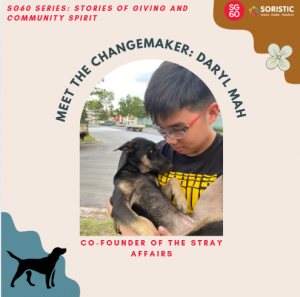
ABOUT DARYL MAH AND THE STRAY AFFAIRS
Daryl Mah is the co-founder of The Stray Affairs, a ground-up dedicated to protecting stray animals in industrial zones such as Kranji, Sungei Kadut and Lim Chu Kang.
What began as a simple act of feeding strays evolved into a full-fledged movement when Daryl realised that shelters were overcrowded and rehoming wasn’t always feasible. “We asked, how do we protect them while they’re still on the streets?” he shared. The answer was a community based model that prioritised safety, nutrition, and early intervention.
Founded officially in 2022, The Stray Affairs operates with a unique ground-up approach. Volunteers provide food, monitor health and coordinate veterinary care, while migrant workers—who live and work in these industrial areas—play a vital role in daily caregiving.
The organisation feeds over 150 dogs and 100 cats across the estates it covers. These areas pose serious risks to stray animals, brought on by exposure to heavy machinery, moving vehicles, and hazardous materials. Without intervention, many would be suffering from malnutrition, dehydration, or injury.
Since its inception, The Stray Affairs has grown to include over 400 volunteers, aged 20 to 54, with 10 to 18 participating in weekly missions. An additional 30 to 40 migrant workers dispense food and medicine throughout the week and alert the team of any injuries, illnesses, or disappearances.
Can you share your journey as a changemaker – and what has kept you motivated to continue?
My journey began simply—seeing stray animals on the streets and wanting to keep them safe by feeding them and trying to get them into shelters. But shelters were always full, and rehoming wasn’t always possible. So the mission shifted to protecting strays where they are: ensuring they’re fed and cared for by the people who see them daily – mainly migrant workers in industrial areas, factories, and dormitories, where most strays are found.
We started supporting these workers by providing proper nutrition and care supplies for the animals. I had volunteered with another group before, but strays were only a small part of their focus. I wanted a space dedicated fully to them. That’s why I started The Stray Affairs—rooted in ground-level care, collaboration with migrant workers, and respect for the animals’ dignity. Here, 100% of our efforts go to stray animals.
What keeps me going is the growing bond with the migrant workers who care for these dogs. Their commitment—looking after the animals even after long workdays—inspires me every day.
What kind of change are you trying to create, and who does it impact the most?
My long-term dream is a world without stray animals, though I know that’s not realistic right now. What I aim for instead is a society where strays are at least tolerated—ideally respected—and where abuse is rare. I want these animals to feel safe, not constantly in survival mode. I also hope for greater respect for animal welfare workers and feeders so we can care for strays without fear or stigma.
This work directly impacts the animals, but it also supports the migrant workers who are our most committed on-the-ground caregivers in factories and dormitories. Many of them already want to help and often feed the dogs with whatever scraps they have. It’s kind, but not always ideal nutritionally—so we step in by providing proper food and making it easier for them to care for the animals in ways that truly benefit them.
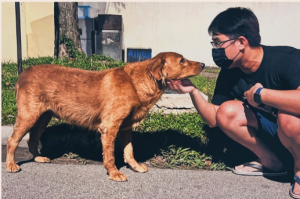
“What we want is a world where stray animals are respected or at least tolerated”—Daryl Mah
What challenges have you faced in your changemaking journey, and how did you overcome them?
Contrary to what people might think, the biggest challenge that we face isn’t the animals. Rather, it is the humans we have to navigate around. Whenever we make life-changing decisions for an animal, we cannot ask them what they want, and not everyone has the same mindset as us.
This difference in mindset creates friction, even with our compassionate volunteers. For example, some workers believe in letting an injured animal pass naturally, while we advocate for medical intervention and rescue. We also face friction internally as different volunteers have different philosophies on welfare—a common disagreement would be natural death versus quick euthanasia. The challenge for us is then this: how do we navigate these conflcits while also holding firm to our core mission?
Another significant challenge is funding. It’s harder for animal welfare causes because the animal can’t say thank you, so many people do not feel the same emotional pull as they do for human causes. The lack of funds is particularly difficult because it can force us to make the hardest decisions about an animal’s care. We overcome this by relying on our generous online donors and simply trying to utilise our available resources as efficiently as possible.
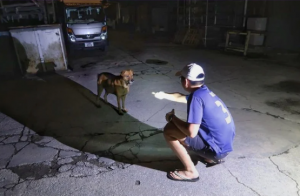
Who or what has made your changemaking journey possible?
Above all, the people who has helped us to make this journey possible are our donors and supporters. They are the ones who see the value in our work, even if we are not a traditional shelter, where they can come and interact with out animals.
Surprisingly, it would also be the people who are already in the industry. We might have our differences in terms of the way we approach the field, but we are united by the common goal of what’s best for the animal.
While the incumbents in the industry might offer us a different perception of the field, it is these differing perspectives that allow us to approach the groundwork of the sector. Beyond financial support, the absolute pillar of our work are the migrant workers who are already living and working in these remote areas. They are driven purely by love and compassion after a tiring workday. The role of The Stray Affairs as an organisation is to provide the logistics and medical support network that our dedicated first responder volunteers require. We empower their existing good intention by making it easier for them to deliver proper, life-saving care to the stray animals.
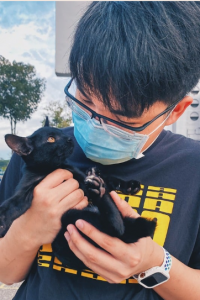
“We may have our differences, but sometimes a common goal—what’s best for the animal—brings us together”—Daryl Mah
How has this journey changes you personally, and what are your hopes for the future?
This journey has fundamentally shaped my perspective of commitment, and what it truly means. I recently graduated and am now juggling my professional career alongside my volunteer work, which is a much more difficult balance than when I was a student.
It has required me to become more strategic in managing the complexity of human perspectives and the emotional weight of making difficult decisions for animals. I also believe that I am more in touch with the ground. That has also made me more realistic about how we deploy our resources.
My hope for the future remains clear. I aspire to create a world where strays are tolerated and feel safe. More broadly, I hope for a society where the difficult, often invisible work done by animal welfare volunteers and on-the-ground feeders is deeply respected and fully supported.
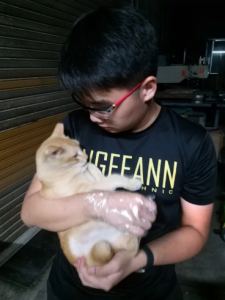
“I still see the value in shelter work, but I’m more in touch with animals on the ground ”—Daryl Mah
SG60 Series: Stories of Giving and Community Spirit
The SG60 Series is a storytelling and research initiative that reimagines philanthropy by spotlighting how everyday individuals, including those from disadvantaged backgrounds, are powerful changemakers in their own right.
We examine the challenges they face, the enablers that support them, and the impact they create. These insights offer ecosystem enablers a valuable opportunity to explore how they can better empower changemakers and catalyse grassroots action. Above all, the stories affirm that anyone can be a changemaker in their own way.
We are deeply grateful to all the changemakers who generously shared their journeys with us.

